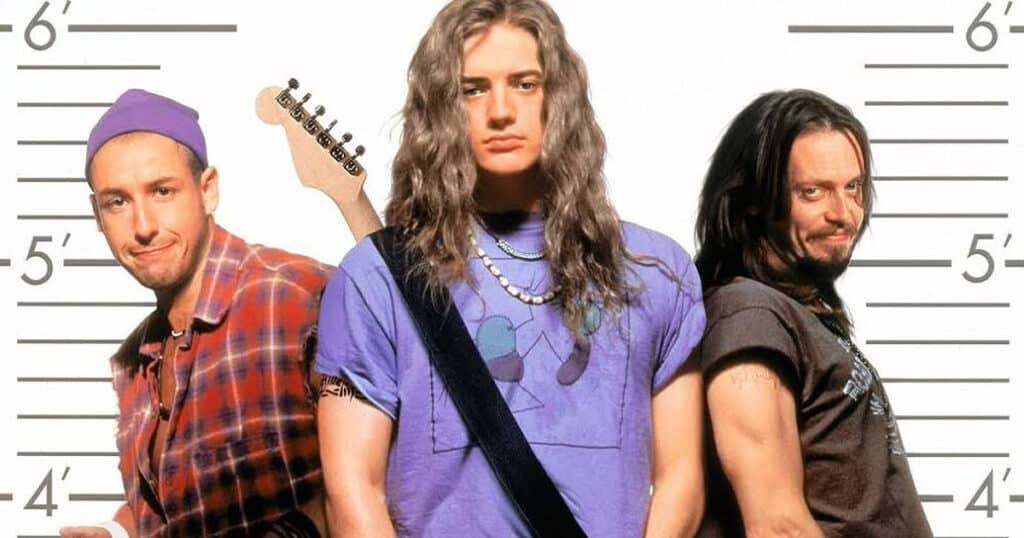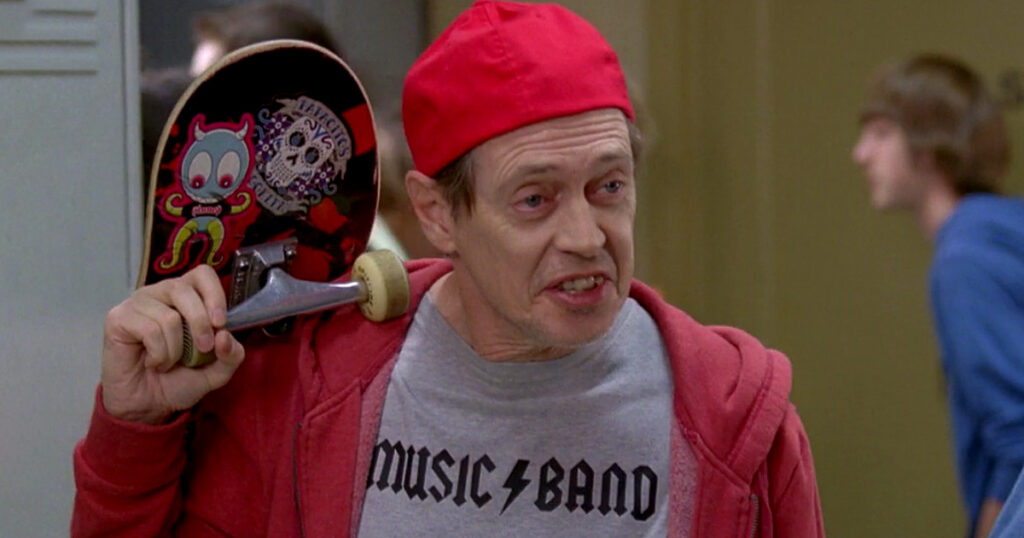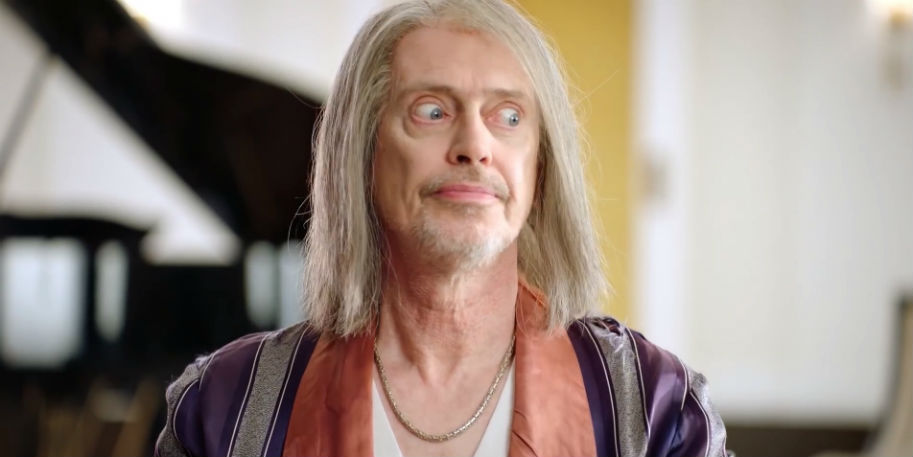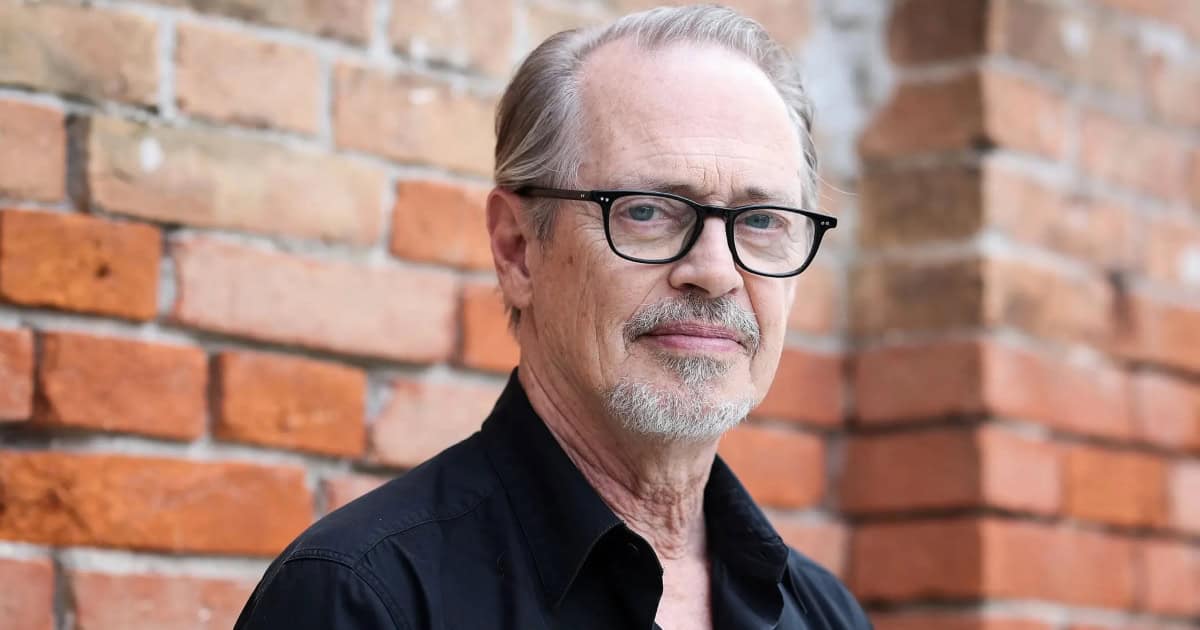An old adage reminds us that “character is what you do when no one is watching.” Steve Buscemi, the acclaimed actor, exemplified this maxim on September 11, 2001, when he reported to Ground Zero and worked with his old unit, Engine Company 55, in Manhattan. Without fanfare, press conferences, or public declarations, Buscemi worked alongside other firefighters in the aftermath of the attacks. It was only later, through chance encounters and quiet disclosures, that the public learned of his selfless actions that day. And so, it’s fitting that Buscemi, a man of character, is best known for his work as a character actor – bringing depth, nuance, and complexity to the roles he’s played on screen, just as he brought courage, compassion, and humility to his work on and after that fateful day.
But how was that courage formed? To know that, we must return to where the beginning began, when he was born ON HIS BIRTHDAY, December 13, 1957, in Brooklyn, New York, to John and Dorothy Buscemi. He grew up in Valley Stream, Long Island, with his three siblings. Buscemi’s childhood was marked by a strong sense of community and a passion for the arts, which was encouraged by his parents. He attended Valley Stream Central High School and later studied drama at Nassau Community College.
Buscemi’s Early Career
Before pursuing a career in acting, Buscemi served as a firefighter with the New York City Fire Department from 1980 to 1984. He worked at Engine Company 55 in Manhattan’s Little Italy. Buscemi’s experience as a firefighter has had a lasting impact on his life and work, and he has often spoken about the camaraderie and sense of purpose it gave him. After leaving the FDNY, Buscemi began taking acting classes and landed his first film role in the 1985 comedy The Way It Is. He went on to study at the Lee Strasberg Theatre & Film Institute and began building a successful acting career.
In 1986’s Parting Glances, Steve Buscemi played Nick, a supporting role in this poignant drama that explored the dynamics of a group of gay friends in New York City. While not a major role, it marked one of Buscemi’s earliest film appearances and showcased his ability to inhabit characters on the fringes of society.
The following year, in 1987’s Kiss Daddy Goodnight, Buscemi portrayed Johnny, further demonstrating his versatility in smaller roles. His performance contributed to the film’s exploration of dysfunctional family dynamics.
In 1989, Buscemi had a more substantial role as Charlie the Barber in Mystery Train, directed by Jim Jarmusch. This anthology film allowed Buscemi to showcase his talent for bringing depth and nuance to eccentric characters, a skill that would become a hallmark of his career.
1990’s Miller’s Crossing saw Buscemi take on the role of Mink, a memorable supporting character in the Coen Brothers’ critically acclaimed neo-noir film. His performance as the fast-talking, idiosyncratic gangster added to the film’s rich tapestry of colorful characters and further cemented his acting reputation.
In 1991’s Barton Fink, Buscemi delivered a standout performance as Chet, the eccentric and enigmatic friend of the film’s titular character. His scenes with John Turturro were highlights of this Coen Brothers masterpiece, showcasing Buscemi’s ability to blend humor and pathos in his portrayal of offbeat individuals.

Buscemi’s career took a significant turn in 1992 with his iconic role as Mr. Pink in Reservoir Dogs. His performance as the cynical and foul-mouthed jewel thief was a scene-stealer, and his tense exchanges with other members of the heist crew remain among the most memorable moments in Quentin Tarantino’s groundbreaking debut film.
Steve Buscemi’s brief cameo in 1994’s Pulp Fiction, where he played a Buddy Holly-impersonating waiter, further cemented his connection to Quentin Tarantino’s distinctive filmmaking style. Interestingly, Tarantino initially considered Buscemi for the role of Jimmie, which the director ultimately played himself. However, scheduling conflicts prevented Buscemi from taking on the part. In a twist of fate, Buscemi ended up playing a waiter, a role that’s ironic given his Reservoir Dogs character Mr. Pink’s notorious aversion to tipping waiters.
Breakout roles
In 1993’s Rising Sun, Buscemi played Willy Wilhelm, a supporting role that allowed him to showcase his comedic chops amidst the film’s neo-noir thriller narrative.
Steve Buscemi’s role in the 1994 movie Airheads is as the bass player of the band called “The Lone Rangers”. The movie is about a band that wants to make it big and get their demo tape played on the radio, but when the DJ refuses, things get out of hand, and they hold the place hostage. In the same year, Buscemi had a memorable cameo as a Beatnik Barman in The Hudsucker Proxy, further cementing his status as a go-to actor for offbeat and idiosyncratic characters. 1995’s Desperado featured Buscemi in a memorable role as, fittingly, a character named Buscemi. His presence added a touch of quirky humor to the action-packed film.
Steve Buscemi played the role of Carl Showalter, a bumbling and eccentric hitman, in the 1996 Coen Brothers film Fargo. His character, along with his partner Gaear, played by Peter Stormare, is hired by William H. Macy’s Gary Lundegaard to kidnap Gary’s wife and demand a ransom from Gary’s wealthy father-in-law. Buscemi’s performance as Carl is memorable for his quirky mannerisms, witty one-liners, and comedic timing, which add a layer of dark humor to the film’s tense and violent moments. Despite his character’s flaws and ineptitude, Carl is a complex and intriguing figure, and Buscemi’s portrayal brings depth and nuance to the role. His chemistry with Stormare and Macy is a highlight of the film. Their characters’ interactions are some of the film’s most compelling moments.
In the same year, Buscemi made his feature directorial debut with Trees Lounge, in which he also starred as Tommy. The film showcased his unique voice as a writer and director, exploring themes of working-class ennui with a distinctive blend of humor and melancholy.
1997’s Con Air saw Buscemi take on the role of Garland Greene, a convict with a peculiar fascination with philosophy and literature. His performance added a touch of quirky humor to the action-packed prison drama.
Buscemi’s role as Donny in 1998’s The Big Lebowski has become one of his most iconic and beloved performances. As the eccentric and often confused friend of Jeff Bridges’ The Dude, Buscemi delivered a masterclass in scene-stealing supporting work, creating a character that has become a cult favorite among fans of the Coen brothers’ classic.
In the widely-renowned masterpiece and arguably greatest film of all time Armageddon, also released in 1998, Buscemi played Rockhound, a member of the team tasked with saving the world from an incoming asteroid. His performance brought a much-needed dose of humor and levity to the high-stakes premise, and his chemistry with co-stars like Bruce Willis and Ben Affleck made him a standout in this ensemble cast.
In 2000, Buscemi directed the gritty drama Animal Factory, further showcasing his skills behind the camera and his ability to explore complex themes and characters.
Steve Buscemi starred in the 2001 thriller Domestic Disturbance with John Travolta and Vince Vaughn. During the filming,” Buscemi was slashed in the face in a bar fight while standing up for Vince Vaughn, which resulted in severe injuries. That year also saw Buscemi lend his distinctive voice to the character of Randall Boggs in the beloved animated film Monsters, Inc. His portrayal of the conniving and misguided villain added depth and humor to the film, and his vocal performance became a highlight of the Pixar classic.
Buscemi reprised his role as Randall Boggs in 2013’s Monsters University and later in the TV show Monsters at Workin 2024, further cementing his place in the iconic Pixar universe. In 2002’s Spy Kids 2: The Island of Lost Dreams and 2003’s Spy Kids 3-D: Game Over, Buscemi played Romero, adding his unique brand of quirky humor to these family-friendly adventures.
Buscemi reunited with Jarmusch for a brief but memorable cameo in the acclaimed 2003 film Coffee and Cigarettes. His appearances in these Jarmusch films cemented his status as a quintessential figure in the realm of American independent cinema, seamlessly inhabiting the director’s wry, character-driven narratives with his inimitable presence and comedic timing.
2003’s Big Fish saw Buscemi deliver a poignant performance as Norther Winslow, showcasing his ability to bring depth and nuance to supporting roles in more emotionally resonant narratives.
In 2004, Buscemi made a memorable guest appearance as Tony Blundetto in the critically acclaimed TV series The Sopranos. His performance as a former convict trying to reintegrate into society added a layer of complexity to the show’s exploration of crime and family dynamics. Buscemi’s involvement with the show extended to directing several episodes, further demonstrating his versatility as a storyteller.
Buscemi’s recurring role as Lenny Wosniak in the hit sitcom 30 Rock began in 2007, and his appearances as the quirky private investigator added a touch of off-kilter humor to the show’s satirical take on the entertainment industry.
In 2010, Buscemi played Wiley in the comedy film Grown Ups, reprising the role in the 2013 sequel Grown Ups 2. These films allowed Buscemi to showcase his comedic talents and appeal to a broader audience.
Boardwalk Empire and beyond
Buscemi’s portrayal of Nucky Thompson in the period crime drama Boardwalk Empire, which premiered in 2010, was a tour de force performance that earned him critical acclaim and numerous accolades. As the influential and complex Atlantic City political boss, Buscemi delivered a nuanced and layered performance that showcased his range as an actor and his ability to anchor a prestige television series.

In 2011, Buscemi made guest appearances on the quirky comedy series Portlandia, playing various eccentric characters and even directing several episodes. This collaboration allowed him to further flex his creative muscles and indulge in his penchant for offbeat humor.
Buscemi lent his distinctive voice to the character of Wayne in the Hotel Transylvania animated film series, starting with the 2012 original and reprising the role in the sequels Hotel Transylvania 2 in 2015 and Hotel Transylvania 3: Summer Vacation in 2018. His vocal performance added a quirky and endearing quality to the lovable werewolf character, contributing to the franchise’s success and appeal to audiences of all ages.
2014 saw Buscemi take on the role of Pete in the critically acclaimed web series Horace and Pete, which he co-created and starred in. This project allowed him to explore complex themes and characters in a more intimate and experimental setting, further cementing his reputation as a versatile and daring artist.
Buscemi’s love for exploring the quirks of everyday life was on full display in the 2015 web series Park Bench, which he directed and starred in. This unique project showcased his talent for finding humor and humanity in the mundane, as he engaged in witty and insightful conversations with everyday people on a park bench in New York City. With his signature wit and curiosity, Buscemi brought out the extraordinary in the ordinary, making Park Bench a charming and delightful watch.
In 2017, Buscemi delivered a standout performance as Nikita Khrushchev in the satirical black comedy The Death of Stalin. His portrayal of the Soviet leader was equal parts hilarious and chilling, showcasing his ability to balance humor and drama with deft precision.
2019 saw Buscemi take on the role of God in the quirky comedy series Miracle Workers. His portrayal of the Almighty added a delightfully irreverent touch to the show’s high-concept premise, and his involvement as a director for several episodes allowed him to put his unique stamp on the project.
Buscemi reunited with his longtime collaborator Jim Jarmusch for the 2019 zombie comedy The Dead Don’t Die. In this satirical take on the horror genre, Buscemi brought his trademark deadpan humor to the role of Farmer Miller, once again proving his mastery at elevating quirky character roles with his inimitable screen presence and comic timing.
In 2020’s Hubie Halloween, Buscemi played Walter Lambert, a supporting role that allowed him to showcase his comedic talents in this Adam Sandler-led horror comedy.
Looking ahead, Buscemi has several exciting projects on the horizon. He is set to play Barry Dort in the highly anticipated Wednesday Season 2, further exploring the delightfully macabre world of the Addams Family spin-off series.
Buscemi is also attached to star in the upcoming film The Shallow Tale of a Writer Who Decided to Write About a Serial Killer, a project that promises to showcase his ability to portray complex and morally ambiguous characters.
He is also slated to appear in the highly anticipated Transformers One, the latest installment in the blockbuster franchise. His involvement in such a high-profile project is a testament to his enduring popularity and versatility as an actor.

Throughout his illustrious career, Steve Buscemi has consistently demonstrated an uncanny ability to breathe life into eccentric, offbeat, and often darkly humorous characters. From his breakout role as Mr. Pink in Reservoir Dogs to his tour de force performance as Nucky Thompson in Boardwalk Empire, Buscemi has carved out a unique niche for himself as a character actor par excellence and a masterful leading man.
What sets Buscemi apart is his ability to find depth and humanity in even the most idiosyncratic or morally ambiguous characters. Whether playing a small-time crook, a philosophical convict, or a Soviet leader, Buscemi brings a level of nuance and complexity that elevates his performances beyond mere caricature.
His collaborations with acclaimed filmmakers like the Coen brothers, Quentin Tarantino, and Jim Jarmusch have showcased his talent for inhabiting the offbeat worlds they create, seamlessly blending humor and pathos in a way that few actors can match.
Beyond his acting prowess, Buscemi’s forays into directing and writing have further cemented his status as a multifaceted artist with a unique voice and vision. Projects like Trees Lounge, Animal Factory, Lonesome Jim, a 2005 comedy-drama exploring family dynamics; Interview, a 2007 remake of Theo Van Gogh’s film about a journalist’s encounter with a celebrity; and The Listener, a 2022 drama about a telephone helpline worker, have allowed him to explore themes and characters that resonate with his sensibilities, offering a glimpse into the mind of one of the most idiosyncratic talents in modern cinema.
In addition to his illustrious career in film and television, Buscemi has also made significant contributions off-screen. He serves on the Advisory Council for Friends of Firefighters, a nonprofit organization that provides mental health and wellness services to active and retired NYFD firefighters and their families. Alongside notable figures like Gary Sinise, Dee Snider, and Kevin Smith, Buscemi contributes to ensuring these brave individuals receive the support they need. His commitment to this cause is a testament to his character and his dedication to giving back to the community, further solidifying his legacy as not just a talented actor and director, but also a compassionate and caring individual.
It’s all the more baffling, then, that Buscemi was attacked while walking down a street in New York City on May 8, 2024. He was taken to a hospital and treated for bruising, swelling, and bleeding to his left eye after being punched. The subject was identified by authorities, but as of this writing, is still at-large. This incident is part of a disturbing trend in New York City, where there have been at least 12 reported incidents of people being randomly attacked over the preceding weeks. Fellow Boardwalk Empire alum Michael Stuhlbarg was also attacked while walking through Central Park 2 months prior, which makes me wonder if it’s an irrational response to hating the show. It’s been off the air for 10 years. Let it go.
But on a more uplifting note, whether stealing scenes in ensemble comedies or anchoring prestige dramas, Steve Buscemi has left an indelible mark on the entertainment landscape. His ability to find humor and humanity in the most unlikely of places has endeared him to audiences and critics alike, cementing his legacy as a true original in the world of acting.

